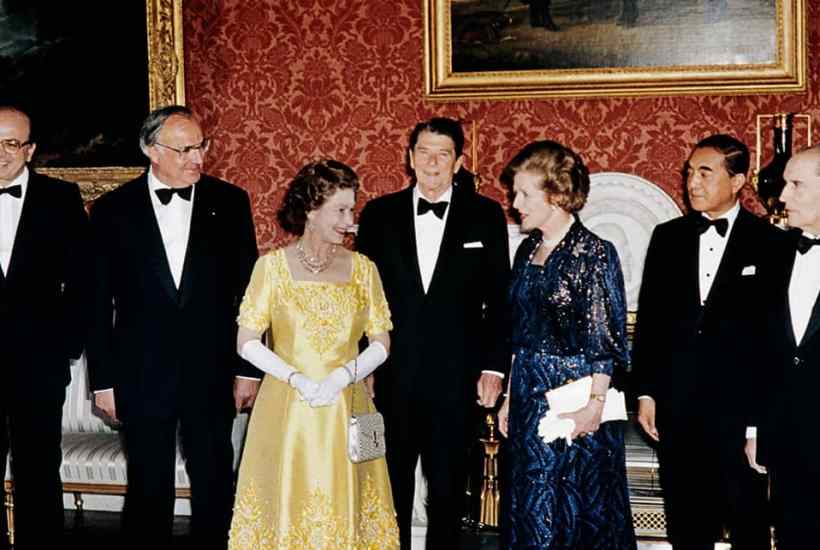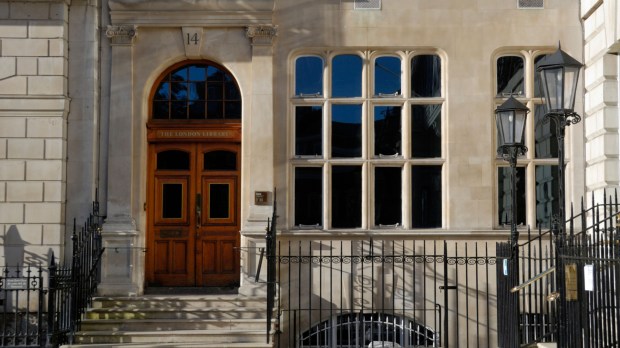‘So it is come at last, the distinguished thing!’ exclaimed Henry James on his deathbed. Such a thought is reflected in funerals – always more powerful than a memorial service or ‘celebration’ – because the person’s body is present. When it comes at last to Elizabeth II on Monday, it will be the most distinguished of all the ceremonies. The Household Division is in charge. It is always and only the Grenadier Guards who make up the bearer party. By then, all serving Guards officers will have stood watch over the coffin for the lying-in-state. The Guards are so called because they must guard the Sovereign in life. Their last, distinguished duty is to guard her in death.
When writing my biography of Margaret Thatcher, I talked to Robert Runcie, Archbishop of Canterbury during the Falklands war. There had been a row about the service of thanksgiving for victory, as Mrs Thatcher saw it, or reconciliation – as some of the clergy, including the Dean of St Paul’s, who conducted it, preferred. The result was an uneasy compromise. The Queen came. As she left, Runcie told me, she felt anxious that the armed forces might feel they had been denied proper thanks and therefore spiritual comfort. ‘I don’t think you should ever leave a Christian service feeling sad,’ she said to Runcie. ‘The service was not well arranged for that reason.’ Her emphasis was on the word ‘leave’. Obviously sadness is a necessary feeling when remembering death, but the desired effect is peace. She understood this deeply. I am sure Monday’s service will follow her understanding, and the congregation will depart in peace.
Under our constitution, the sovereign, though Supreme Governor of the Church of England, becomes a member (not Governor) of the Church of Scotland whenever she/he crosses the border. The late Queen, by dying at Balmoral, therefore technically died a Presbyterian, the only British monarch to have done so. How ecumenical, how good for the Union – almost as if she had intended it.
Prue Penn, who writes so well about her old friend and contemporary the Queen elsewhere in this magazine, once lured me into a trap. She asked me to speak at her 90th birthday party. Although underqualified, I felt it was an honour to celebrate this splendid and beautiful woman. I accepted. A fortnight later, Prue rang again: ‘Oh, by the way, the Queen is coming. So are Prince Philip and four other members of the royal family.’ I was terrified, because the occasion was informal. It must be quite easy to address the sovereign formally, because there are prescribed usages. But this was a personal, private dinner for 70 friends and family in a restaurant (Bellamy’s) – a rarity for the Queen, I imagine. I had to pay tribute to Her Majesty for the many kindnesses she had shown to Prue, and yet try to be light-hearted, witty, after-dinnerish. As a result, it was not a good speech; but it passed off without incident and was certainly not as ribald as the songs by Nicky Haslam that followed it. Once my ordeal was over, I was seated with the Queen. ‘Philip,’ she said, ‘is reading your book and enjoying it very much. But I gather there’s more to come.’ Adopting the voice of oily self-deprecation which I find I use in my rare royal conversations, I said: ‘Yes, ma’am, I’m frightfully sorry, but I’m afraid there will be a third volume.’ ‘Oh, don’t worry,’ said the Queen, ‘I shan’t read it!’ I loved this reaction, first for its honesty (it is what many people think, but don’t say), second because it embodied the attitude of the Hanoverian dynasty to books. I felt proud to be in the same situation as Edward Gibbon presenting his latest volume of The Decline and Fall of the Roman Empire to King George III’s brother, the Duke of Gloucester, and being told: ‘Another damn’d thick, square book! Always, scribble, scribble, scribble, eh, Mr Gibbon.’ Dear Prue has permitted me to tell this story. Dare I quote Elizabeth II’s words as a sort of anti-endorsement on the dust jacket of subsequent editions of volume three?
More should be written about how to depict the Queen. She was, after all, the most frequently caricatured figure in her time, possibly in any time. I asked Nick Garland, who was the Telegraph’s main cartoonist for about 40 years, about this. She was hard to depict, he said, because you had to ask yourself: ‘Which Queen? Young? Middle-aged? Frail and tiny in old age? There was no one way of doing her as there is with, say, Winston Churchill.’ Then there was the need for respect for her as head of state. This could be avoided, he felt, only if the situation was ‘completely pantomimic’, as with Barry McKenzie – the Australian thicko whom Barry Humphries invented in 1964 in a cartoon strip drawn by Garland in Private Eye. In a spooky foreshadowing of Michael Fagan’s real-life entry into the Queen’s bedroom in 1982, Barry bursts through her window in Buckingham Palace (‘Starve the lizards – it’s her!’) as she is brushing her teeth. He declares his undying devotion to ‘Little Liz’, which is not reciprocated (‘We must ask you to leave’). Then a furious Duke of Edinburgh appears and Barry ends up in the Tower of London. Nick found her face fascinating. ‘The Queen’s likeness is discovered in her smile,’ he says, not in her profile (despite her strong ‘Windsor nose’). ‘It is a very, very interesting smile. She is truly amused.’
Attending the Presentation of Addresses on Monday, I noticed the smell which entered Westminster Hall as the new King left. It was good, old-fashioned, un-green petrol fumes. They were caused by his magnificent 1950 Rolls-Royce Phantom which presumably cannot adapt to lead-free fuel, let alone to electricity. An omen, I hope, of the less vigorous pursuit of pet causes which Charles III promised in his outstanding first broadcast to the nation.
Got something to add? Join the discussion and comment below.
Get 10 issues for just $10
Subscribe to The Spectator Australia today for the next 10 magazine issues, plus full online access, for just $10.
You might disagree with half of it, but you’ll enjoy reading all of it. Try your first month for free, then just $2 a week for the remainder of your first year.















Comments
Don't miss out
Join the conversation with other Spectator Australia readers. Subscribe to leave a comment.
SUBSCRIBEAlready a subscriber? Log in